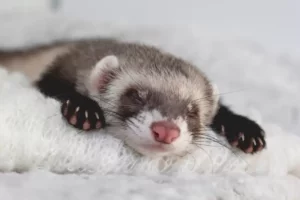Why Is My Ferret's Hair Falling Out?


Written and verified by the veterinarian and zootechnician Sebastian Ramirez Ocampo
The ferret is a small mustelid that has become very popular as a pet in recent years. Because of its physical and behavioral characteristics, this pet has become a great option for people who can’t or don’t want to have a cat or dog in their homes. But they’re not without they’re problems, and one of them is when a ferret’s hair starts to fall out.
However, ferret care differs considerably from that of a dog or cat. For example, bathing, which is recommended once a month for dogs, is only recommended once every two months for ferrets.
This is due to the fact that, morphologically, the skin and hair of these mustelids is a bit delicate. For this reason, they need to keep the fats that protect the fur and dermis as long as possible. So, given the lack of knowledge about this aspect of a ferret’s characteristics, we’re going to tell you the causes and solutions when a ferret’s hair starts falling out.
A ferret’s hair
Due to the inability to thermoregulate its body adequately through perspiration, the ferret must adapt its coat according to the climatic season. Because of this, the shedding process generally occurs twice a year.
On the one hand, there’s a change from a short coat to a longer coat in autumn to prepare for the cold of winter. And the other molt from long to short hair occurs in the spring months, in preparation for the summer season.
This seasonal coat change is very typical in ferrets, so you shouldn’t be alarmed if you start to see more hair than normal in your home. However, if you notice some patches on the body without fur, it would be good to consult an expert veterinarian, as it could be some sort of disease.
The normal thing in these cases of molting is to be able to observe that the new hair is coming through at the same time that the old hair is falling out.

Another common manifestation in ferrets is fur loss on the tail. This occurs mainly in young, “intact” animals, i.e., those that haven’t been spayed or neutered. It shouldn’t cause concern if hair loss is only limited to this area of the body. In addition, this situation usually lasts only a couple of months and then the hair will grow back.
Vaccinations
Like other domestic animals such as dogs and cats, ferrets should be vaccinated against different diseases. Among the main ones we find the vaccines against rabies and distemper.
On some occasions, a badly injected vaccination can cause hair loss in the area of the injection. Also, in most cases, the coat may not grow back at this point. However, this shouldn’t be a cause for concern, as it’s only a reaction of the body to the vaccine.
Ferret feeding deficiencies
An imbalance in your ferret’s diet won’t only cause weight loss, but also the deterioration of the coat with hair loss too. Ferrets that are poorly nourished usually have hair without much shine, as well as it being brittle and with localized or generalized alopecia. In these cases, it’s suggested that you consult a professional who will recommend the ideal supplements or a change of diet for each individual case.
Adrenal hyperplasia
According to the document Adrenal gland disease in ferrets, adrenal hyperplasia is a common disease in ferrets and is characterized by a limitation in the production of certain hormones in the adrenal glands. Although the true causes of the disease aren’t known, it’s theorized that its origin is genetic.
Animals affected by this pathology develop symptoms such as hair loss, pruritus, thinning skin, lethargy, and, in females, enlargement of the vulva. Alopecia is generally located on the tail, although a lack of fur can also be seen on the belly, back and limbs.
This mainly affects castrated ferrets and ferrets older than three years. In the presence of any of these symptoms, you should go to your veterinarian to establish the correct treatment for its resolution.

Prolonged estrus
Generally, estrus in female ferrets lasts from 5 to 10 days. Sometimes, due to hormonal disorders, it can last more than a month, which becomes pathological. In these cases, the help of a professional should be sought to stop the estrus by means of specific medications, since not only hair loss occurs, but also the life of your pet will be at risk due to the possible appearance of aplastic anemia.
Allergies in ferrets
Finally, bites from insects such as fleas can trigger an allergic reaction in your ferret’s body. In these cases, the hair loss will be localized in the area of the bite. For this reason, it’s important to keep your pet free of these parasites.
Now that you know the main causes of problems related to your ferret’s hair, it’s your responsibility to identify the symptoms to find out if it’s normal or related to a disease. Remember to always seek the advice of a specialized veterinarian and don’t treat your pet on your own.
The ferret is a small mustelid that has become very popular as a pet in recent years. Because of its physical and behavioral characteristics, this pet has become a great option for people who can’t or don’t want to have a cat or dog in their homes. But they’re not without they’re problems, and one of them is when a ferret’s hair starts to fall out.
However, ferret care differs considerably from that of a dog or cat. For example, bathing, which is recommended once a month for dogs, is only recommended once every two months for ferrets.
This is due to the fact that, morphologically, the skin and hair of these mustelids is a bit delicate. For this reason, they need to keep the fats that protect the fur and dermis as long as possible. So, given the lack of knowledge about this aspect of a ferret’s characteristics, we’re going to tell you the causes and solutions when a ferret’s hair starts falling out.
A ferret’s hair
Due to the inability to thermoregulate its body adequately through perspiration, the ferret must adapt its coat according to the climatic season. Because of this, the shedding process generally occurs twice a year.
On the one hand, there’s a change from a short coat to a longer coat in autumn to prepare for the cold of winter. And the other molt from long to short hair occurs in the spring months, in preparation for the summer season.
This seasonal coat change is very typical in ferrets, so you shouldn’t be alarmed if you start to see more hair than normal in your home. However, if you notice some patches on the body without fur, it would be good to consult an expert veterinarian, as it could be some sort of disease.
The normal thing in these cases of molting is to be able to observe that the new hair is coming through at the same time that the old hair is falling out.

Another common manifestation in ferrets is fur loss on the tail. This occurs mainly in young, “intact” animals, i.e., those that haven’t been spayed or neutered. It shouldn’t cause concern if hair loss is only limited to this area of the body. In addition, this situation usually lasts only a couple of months and then the hair will grow back.
Vaccinations
Like other domestic animals such as dogs and cats, ferrets should be vaccinated against different diseases. Among the main ones we find the vaccines against rabies and distemper.
On some occasions, a badly injected vaccination can cause hair loss in the area of the injection. Also, in most cases, the coat may not grow back at this point. However, this shouldn’t be a cause for concern, as it’s only a reaction of the body to the vaccine.
Ferret feeding deficiencies
An imbalance in your ferret’s diet won’t only cause weight loss, but also the deterioration of the coat with hair loss too. Ferrets that are poorly nourished usually have hair without much shine, as well as it being brittle and with localized or generalized alopecia. In these cases, it’s suggested that you consult a professional who will recommend the ideal supplements or a change of diet for each individual case.
Adrenal hyperplasia
According to the document Adrenal gland disease in ferrets, adrenal hyperplasia is a common disease in ferrets and is characterized by a limitation in the production of certain hormones in the adrenal glands. Although the true causes of the disease aren’t known, it’s theorized that its origin is genetic.
Animals affected by this pathology develop symptoms such as hair loss, pruritus, thinning skin, lethargy, and, in females, enlargement of the vulva. Alopecia is generally located on the tail, although a lack of fur can also be seen on the belly, back and limbs.
This mainly affects castrated ferrets and ferrets older than three years. In the presence of any of these symptoms, you should go to your veterinarian to establish the correct treatment for its resolution.

Prolonged estrus
Generally, estrus in female ferrets lasts from 5 to 10 days. Sometimes, due to hormonal disorders, it can last more than a month, which becomes pathological. In these cases, the help of a professional should be sought to stop the estrus by means of specific medications, since not only hair loss occurs, but also the life of your pet will be at risk due to the possible appearance of aplastic anemia.
Allergies in ferrets
Finally, bites from insects such as fleas can trigger an allergic reaction in your ferret’s body. In these cases, the hair loss will be localized in the area of the bite. For this reason, it’s important to keep your pet free of these parasites.
Now that you know the main causes of problems related to your ferret’s hair, it’s your responsibility to identify the symptoms to find out if it’s normal or related to a disease. Remember to always seek the advice of a specialized veterinarian and don’t treat your pet on your own.
All cited sources were thoroughly reviewed by our team to ensure their quality, reliability, currency, and validity. The bibliography of this article was considered reliable and of academic or scientific accuracy.
- Simone-Freilicher E. Adrenal gland disease in ferrets. The veterinary clinics of North America Exotic animal practice. 2008;11(1):125-37, vii.
- Patterson MM, Rogers AB, Schrenzel MD, Marini RP, Fox JG. Alopecia attributed to neoplastic ovarian tissue in two ferrets. Comparative medicine. 2003;53(2):213-7.
- Nixon AJ, Ashby MG, Saywell DP, Pearson AJ. Seasonal fiber growth cycles of ferrets (Mustela putorius furo) and long-term effects of melatonin treatment. The Journal of experimental zoology. 1995;272(6):435-45.
- Codina R, Reichmuth D, Lockey RF, Jaen C. Ferret allergy. The Journal of allergy and clinical immunology. 2001;107(5):927.
This text is provided for informational purposes only and does not replace consultation with a professional. If in doubt, consult your specialist.








